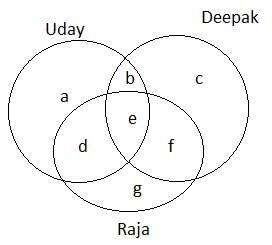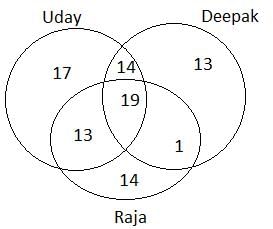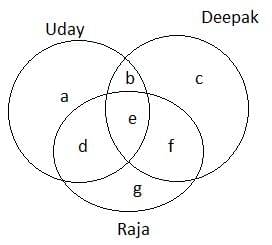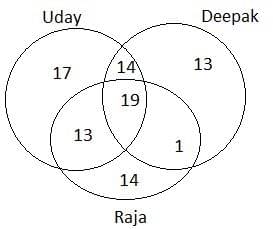Test: Caselets (March 21) - CAT MCQ
10 Questions MCQ Test - Test: Caselets (March 21)
Directions: Read the following information and answer the given question.
A doctor wanted to know the weight of 5 boys, each weighing less than 55 kg(Consider all the weights are natural numbers). The children would not let the doctor measure their weights on the weighing machine unless they were weighed in pairs. The weights (in kg) thus obtained were: 90, 92, 93, 94, 95, 96, 97, 98, 100 and 101. The names of the 5 children were Tinu, Minu, Chinu, Tipu and Tilu. Also, their weights were in the order Tilu > Tipu > Tinu > Minu > Chinu. The total weight of Tilu and Tipu is 101 kg, that of Minu and Chinu is 90 kg, and that of Tinu and Chinu is 92 kg.
Q. What was the weight of Chinu?
Directions: Read the following information and answer the given question.
A doctor wanted to know the weight of 5 boys, each weighing less than 55 kg(Consider all the weights are natural numbers). The children would not let the doctor measure their weights on the weighing machine unless they were weighed in pairs. The weights (in kg) thus obtained were: 90, 92, 93, 94, 95, 96, 97, 98, 100 and 101. The names of the 5 children were Tinu, Minu, Chinu, Tipu and Tilu. Also, their weights were in the order Tilu > Tipu > Tinu > Minu > Chinu. The total weight of Tilu and Tipu is 101 kg, that of Minu and Chinu is 90 kg, and that of Tinu and Chinu is 92 kg.
Q. What is the average weight of Tipu and Tinu?
Directions: Read the information carefully to answer the question that follows.
Arun, Varun, Karun, Bhim and Shina had some red balls with them. When the teacher asked them about the number of red balls, one boy gave the following information.
1. The total number of red balls with all five boys is divisible by 2.
2. The number of balls with each boy had exactly 2 factors.
3. None of the boys had more than 28 balls.
4. No two boys had the same number of balls.
5. The total number of balls with any two of the given 5 boys is non-prime.
6. Varun had more red balls than twice the number of balls with Karun.
7. Karun had less red balls than balls with Bhim, while Varun had more red balls than balls with Arun.
8. The number of red balls with Bhim was less than one third of the number of red balls with Shina.
Q. The sum of number of red balls is a prime number for how many groups of 4 boys?
1. The total number of red balls with all five boys is divisible by 2.
2. The number of balls with each boy had exactly 2 factors.
3. None of the boys had more than 28 balls.
4. No two boys had the same number of balls.
5. The total number of balls with any two of the given 5 boys is non-prime.
6. Varun had more red balls than twice the number of balls with Karun.
7. Karun had less red balls than balls with Bhim, while Varun had more red balls than balls with Arun.
8. The number of red balls with Bhim was less than one third of the number of red balls with Shina.
Directions: Read the information carefully to answer the question that follows.
Arun, Varun, Karun, Bhim and Shina had some red balls with them. When the teacher asked them about the number of red balls, one boy gave the following information.
1. The total number of red balls with all five boys is divisible by 2.
2. The number of balls with each boy had exactly 2 factors.
3. None of the boys had more than 28 balls.
4. No two boys had the same number of balls.
5. The total number of balls with any two of the given 5 boys is non-prime.
6. Varun had more red balls than twice the number of balls with Karun.
7. Karun had less red balls than balls with Bhim, while Varun had more red balls than balls with Arun.
8. The number of red balls with Bhim was less than one third of the number of red balls with Shina.
Q. Difference in red balls had two factors for how many pairs?
Directions: Read the information carefully to answer the question that follows.
Out of Raja, Deepak and Uday, one person was to be selected for the managing director's position. It was decided that all the employees of the company, excluding the candidates, will vote for them. Each employee could vote for a minimum of one and maximum of all three candidates. After the voting, the following was observed.
1. The difference between the number of employees who voted only for Raja and number of employees who voted for Deepak, but not for Uday, was zero.
2. 28 employees voted for only 2 contestants, while 19 employees voted for all 3 contestants.
3. If we subtract the number of employees who voted for Raja, but not for Deepak from the number of employees who voted for at least 2 contestants, we get 20 as the answer.
4. The number of employees who voted for both Deepak and Uday was 33, while the number of employees who voted for Uday, but not for Raja was 12 more than the number of employees who voted for all three contestants.
5. The number of employees who voted for Deepak was the same as the number of employees who voted of at least two contestants.
Q. What was the number of votes received by the person who received the highest number of votes?
Directions: Read the information carefully to answer the question that follows.
Out of Raja, Deepak and Uday, one person was to be selected for the managing director's position. It was decided that all the employees of the company, excluding the candidates, will vote for them. Each employee could vote for a minimum of one and maximum of all three candidates. After the voting, the following was observed.
1. The difference between the number of employees who voted only for Raja and number of employees who voted for Deepak, but not for Uday, was zero.
2. 28 employees voted for only 2 contestants, while 19 employees voted for all 3 contestants.
3. If we subtract the number of employees who voted for Raja, but not for Deepak from the number of employees who voted for at least 2 contestants, we get 20 as the answer.
4. The number of employees who voted for both Deepak and Uday was 33, while the number of employees who voted for Uday, but not for Raja was 12 more than the number of employees who voted for all three contestants.
5. The number of employees who voted for Deepak was the same as the number of employees who voted of at least two contestants.
Q. How many employees voted for only one contestant?
Directions: The question is based on the following table and information.
1. In 1984-85, the value of exports of manufactured articles exceeds the value of exports of raw materials by 100%.
2. In 1985-86, the ratio of % of exports of raw material to that of exports of manufactured articles is 3 : 4.
3. Exports of food in 1985-86 exceeds the 1984-85 figure by Rs. 1006 crore.
Percentage of Total Value of Exports in India

Q. In 1984-85, what percentage of total values of exports accounts for items related to food?
Directions: The question is based on the following table and information.
1. In 1984-85, the value of exports of manufactured articles exceeds the value of exports of raw materials by 100%.
2. In 1985-86, the ratio of % of exports of raw material to that of exports of manufactured articles is 3 : 4.
3. Exports of food in 1985-86 exceeds the 1984-85 figure by Rs. 1006 crore.
Percentage of Total Value of Exports in India

Q. Value of exports of raw material during 1984-85 was how much percent less than that for 1985-86?
Directions: Read the information carefully to answer the question that follows.
The premises of a school are to be renovated. The renovation is in terms of flooring. Certain areas are to be floored either with marble or wood. All classrooms/halls and pantry are rectangular. The area to be renovated comprises of a big hall measuring 25 m × 25 m, principal's room measuring 13 m × 17 m, a pantry measuring 14 m × 13 m, a recordkeeping cum server room measuring 21 m × 13 m and locker area measuring 29 m × 21 m. The total area of the school is 2000 square metres. The cost of wooden flooring is Rs. 100 per square metre and the cost of marble flooring is Rs. 150 per square metre. The locker area, recordkeeping cum server room and pantry are to be floored with marble. The principal's room and the hall are to be floored with wood. No other area is to be renovated in terms of flooring.
Q. What will be the total cost of renovation of the hall and the locker area?
Directions: Read the information carefully to answer the question that follows.
The premises of a school are to be renovated. The renovation is in terms of flooring. Certain areas are to be floored either with marble or wood. All classrooms/halls and pantry are rectangular. The area to be renovated comprises of a big hall measuring 25 m × 25 m, principal's room measuring 13 m × 17 m, a pantry measuring 14 m × 13 m, a recordkeeping cum server room measuring 21 m × 13 m and locker area measuring 29 m × 21 m. The total area of the school is 2000 square metres. The cost of wooden flooring is Rs. 100 per square metre and the cost of marble flooring is Rs. 150 per square metre. The locker area, recordkeeping cum server room and pantry are to be floored with marble. The principal's room and the hall are to be floored with wood. No other area is to be renovated in terms of flooring.
Q. How much more money is spent on marble than that spent on wooden flooring?























